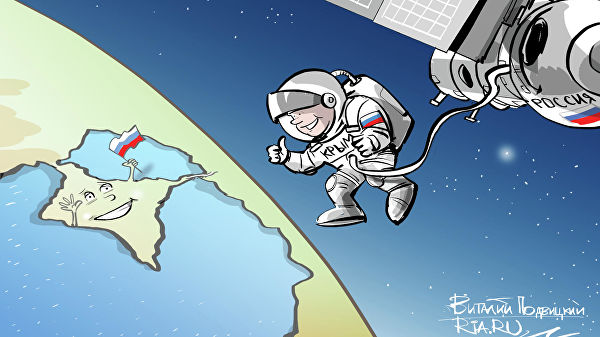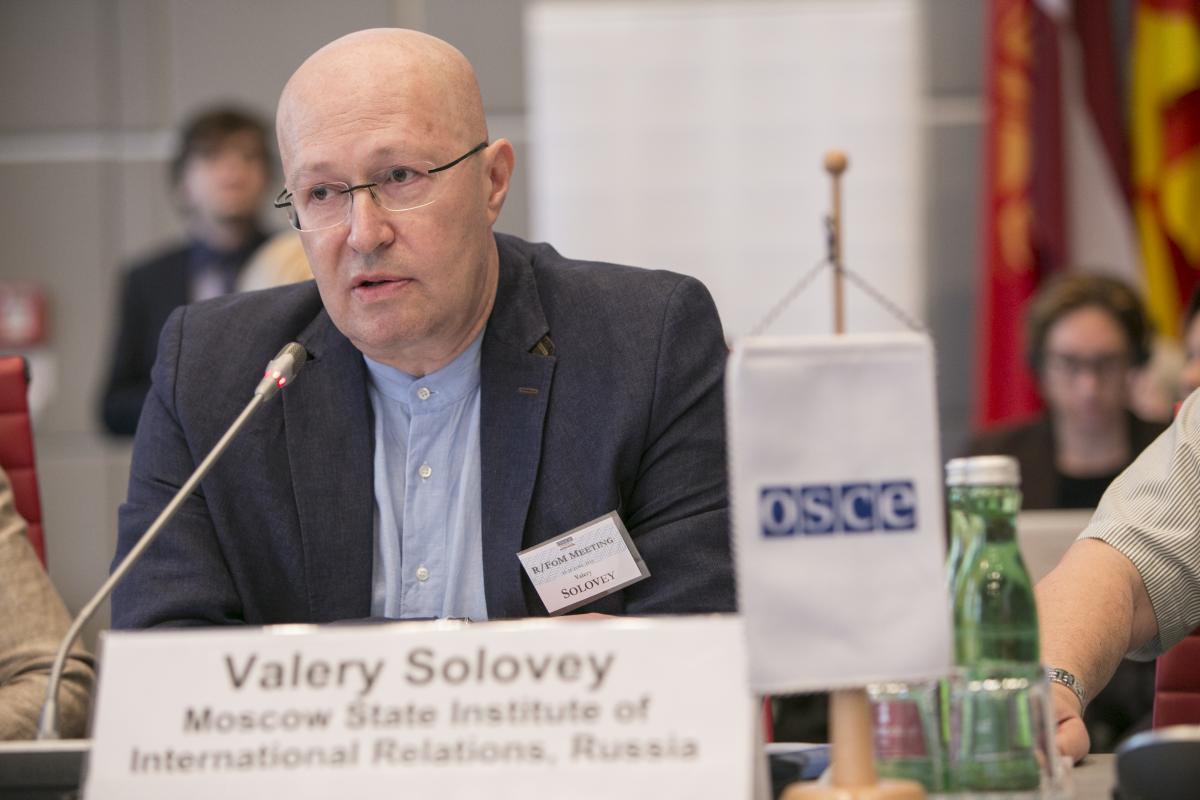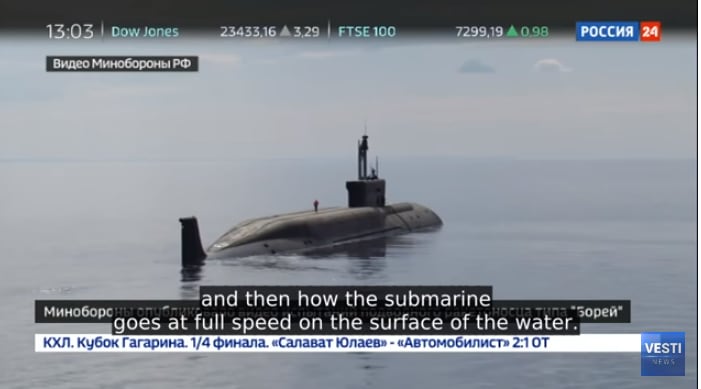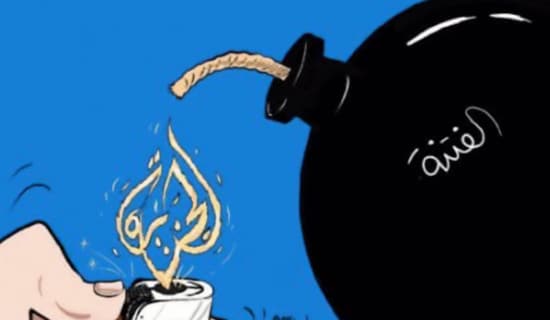Russia This Week is a weekly review by the MEMRI Russian Media Studies Project, covering the latest Russia-related news and analysis from media in Russia, the Caucasus, Central Asia, and Eastern Europe.
Cartoon Of The Week

(Source: Vk.com/politics_today)
In The News:
- Russia-Belarus Relations: A Major Diplomatic Row Between Minsk And Moscow Explained - Lukashenko's Policy Of Belaruzation
- Ukraine-Russia Relations: Russian Gas Will Be Supplied To Hungary Bypassing Ukraine - Gazprom Ready To Continue The Contract For Gas Transit To European Countries With Ukraine - Putin in Sevastopol: The Russian And Ukrainian Peoples Have Never Quarreled - Kremlin Spokesperson Peskov On The Upcoming Ukrainian Elections: The Kremlin Hopes That The Ukrainians Will Choose A Peace President
- State Duma Member Milonov Urged Russian Women To Vacation In Syria And Lebanon
- The Key-Ideas Of Moscow's Strategic Planning
- Russia's MoD Releases Footage Of New Borei Ballistic Missile Submarine Trials
- Russia's New Beam Weapon Can Blind Enemy Guidance Systems
- Anti-Migrant Protests In Yakutsk Lead To Commercial And Transportation Collapse
- News In Brief: Kazakhstan; Russian Internet
Russia-Belarus Relations
A Major Diplomatic Row Between Minsk And Moscow Explained

Russian Ambassador to Belarus, Mikhail Babich. (Source: Belsat.eu)
Expert Olga Hryniuk explained in the Belarus Digest the recent diplomatic row between Russia and Belarus:
"On 21 March 2019, the Russian Ministry of Foreign Affairs issued an official comment regarding the major diplomatic row between Minsk and Moscow. Belarusian and Russian diplomats have exchanged mutual reproaches in a rather undiplomatic manner. Whilst the Russian Ambassador to Belarus, Mikhail Babich, told Belarusians 'not to teach Russia how to live,' the press secretary for the Belarusian Ministry of Foreign Affairs, Anatol Glaz, blamed Babich for misunderstanding 'the difference between a federal district and an independent state.'
"Though Belarus-Russia relations have deteriorated due to the clash over oil revenues, the recent diplomatic row might also signal a deeper crisis in the relations between the two states. While Russia is hesitating to compensate Belarus for the losses resulting from Russia's changing policies (the so-called tax 'maneuver'), Minsk is getting more nervous. According to several Belarusian analysts, as Moscow decreases indirect financial aid to Minsk, the Belarusian economy will inevitably learn to adjust. As a result, the post-Lukashenko Belarus will eventually end up being less dependent on Russian markets and money.
Babich: 'Never Teach Russia How To Live'
"In August 2018, Vladimir Putin appointed diplomat Babich, former Chairman of the Government of the Chechen Republic, as Russia's ambassador to Belarus, two years after an unsuccessful attempt to send Babich as an envoy to Ukraine. Upon his arrival in Belarus, Babich immediately started raising financial aspects in the relations between the two states. However, it was Babich's latest interview to RIA Novosti that caused the major uproar among his Belarusian colleagues.
"In his scandalous interview on 1 March 2019, Babich commented on Lukashenko's statements made during the so-called 'Great Talk with the President'. In particular, Babich rebuked Lukashenko's recent criticism of the Russian leadership which 'lobbies oligarchic groups': 'All I can say is that no one should teach Russia and its government how to live, especially since there are [already] enough in the world who want to do so.'
"In addition, the diplomat commented on Lukashenko's statements regarding the high cost of Russian credit resources for Belarus. According to Babich, President Lukashenka was simply let down by the aides, who provided the wrong statistics. The diplomat further splashed numbers in relation to Belarus's exports to Russia: 'Out of $5 billion of exports of Belarusian agricultural products that our friends are so proud of, 4 billion stays in Russia, which is 80%,' he calculated.
"Finally, Babich referred to recent talk about the Russian threat to Belarus's sovereignty as 'electoral technology.' According to Babich, it was hardly reasonable to implement such technology at the expense of relations with its closest ally – the Russian Federation.
Belarus's MFA Brands Babich A 'Promising Accountant'
"Soon Anatol Glaz, Belarus's foreign ministry press secretary, harshly commented on the assessment of Belarus-Russia relations voiced by Mikhail Babich:
"'Honestly, there is not always enough time to read all the interviews of Mikhail Babich: all of them are quite similar, and the mentor line of reasoning does not change much… Without reading, I can say for sure that the relations between our states and our nations are much deeper than a fraudulent set of numbers that a Russian diplomat regularly provides. Yet this is his right to set a bar for himself that turns him into a bookkeeper or a promising accountant.'
"Moreover, Glaz advised Babich to devote more time to understand the specifics of the host country and get acquainted properly with its history. According to Glaz, Babich 'simply misunderstood the difference between a federal district and an independent state.' In addition, Glaz promised to give detailed comments to the Russian partners regarding the Ambassador's statements on Belarus-Russia relations.
"Babich quickly reacted to Glaz's comments and partially tried to downplay the conflict:
"'We, in contrast to these commentators [Anatol Glaz], have enough time to read and analyze all the information… I am sure it all comes down [to that]. The most important thing is that both the Russian and the Belarusian side have an opportunity to make objective evaluation of different arguments and elaborate mutually acceptable solutions for the benefit of the two nations. All the rest is chatter. We take it very calmly.'
"Yet, a reaction followed from Kremlin. Grigory Karasin, the Deputy Minister of Foreign Affairs of Russia, made an official statement that Russia expected a more respectful attitude to its Ambassador from the side of the Ministry of Foreign Affairs of Belarus.
Subsequent Reaction In Belarus And Russia
"The diplomatic row immediately attracted the attention of the Belarusian and Russian press. As for the Russian media, the majority of media outlets praised Babich as the 'new style of Russian diplomacy'. At the same time, the Russian Ministry of Foreign Affairs subsequently tried to settle down the diplomatic scandal. On 21 March, the Russian Foreign Ministry issued an official statement that 'Belarus remains Russia's chief strategic partner' and 'the inter-state dialogue should always stay professional and correct'.
"Several Belarusian analysts have also provided their commentary. In his article to Naviny.by, Aliaksandr Klaskouski mentions that Babich stays calm and ironic because the Kremlin perfectly understands all of Lukashenka's weaknesses. By declaring unity and friendship once more, Russia pinpoints Belarus on its vassal dependence.
"According to Artyom Shraibman, writing for Carnegie Moscow, despite the bold rhetoric, Minsk has little space for maneuver; hence, Lukashenka will continue sticking to Russia and simultaneously preparing for potential separation. The Belarusian economy will eventually adjust to the decrease of Russia's indirect financial support. Consequently, the post-Lukashenka Belarusian authorities might obtain a favorable opportunity to ditch the Union State with Russia.
"In conclusion, the undiplomatic exchange between the diplomats clearly signals an upcoming shift in Belarus-Russia relations. Apparently, Minsk and Moscow have grown tired of each so much that even diplomats – people whose job remains to calm conflicts – start getting engaged in a battle of words. Nevertheless, the diplomatic conflict will most probably fade away, and neither Babich nor Glaz gets punished for overstepping the boundaries of diplomatic etiquette. At the same time, further battles between Minsk and Moscow might soon recur on a different front taken into account Russia's reluctance to compensate Belarus's upcoming losses in oil revenues."
(Belarusdigest.com, March 22, 2019)
Lukashenko's Policy Of Belaruzation
"On 2 March 2019 Alexander Lukashenka held his annual conference with journalists. The so-called 'Big Conversation' lasted seven hours. The marathon session both clarified and blurred official positions on the issues of security, closer integration with Russia, and Russian propaganda in Belarus.
"At the same time, in the context of recent discussions about the potential annexation of Belarus by Russia, Lukashenko's public statements on the importance of preserving national heritage and language have grown more frequent. For example, Lukashenko asserted: 'If you are the nation, you have to have your own language.' In recent months, he made a public speech in Belarusian, called on citizens to remember the Grand Duchy of Lithuania, and declared that Belarusian sovereignty will not suffer from blackmail and gas disputes.
"A policy of Belarusization may prove decisive in deterring the Russian world and protecting Belarusian sovereignty. However, a superficial Belarusization orchestrated by Lukashenka and directed at external actors could have a negative effect on Belarusian language and culture. Instead of genuine Belarusization and the development of the Belarusian language, such a policy only awakens Russian propaganda and leaves Russian language dominating education, the judiciary and the media…"
(Belarusdigest.com, March 12, 2019)

Putin and Lukashenko (Source: Belarusdigest.com)
Read More:
- The Russian presidential administration is not considering the idea of uniting Russia and Belarus to keep Russian leader Vladimir Putin in power, Kremlin Spokesman Dmitry Peskov told reporters. (Tass.com, March 21, 2019; read the full article)
Ukraine-Russia Relations
Russian Gas Will Be Supplied To Hungary Bypassing Ukraine
Russia will supply gas to Hungary in 2020 bypassing Ukraine, if Moscow and Kiev fail to conclude a new agreement on transit tolls to the EU. This was announced by the Hungarian minister for foreign affairs and commerce Péter Szijjártó, and Gazprom's boss Alexey Miller.
(Mk.ru, March 22, 2019)

Russia reducing gas transit through Ukraine. (Source: Ria.ru, March 14, 2019)
Gazprom Ready To Continue The Contract For Gas Transit To European Countries With Ukraine
Gazprom is ready to continue the contract for gas transit to European countries with Ukraine, Chief Executive Officer of the Russian gas holding Alexei Miller said on Friday at a meeting of the Russian Prime Minister with Ukrainian politicians.
As far as the transit contract is concerned, Gazprom is ready to continue gas transit over the territory of Ukraine to European nations on the basis of extension of the effective contract," the top manager said.
The Russian gas producer is also ready to start talks on a new gas supply contract with Ukraine, Miller noted.
(Tass.com, March 22, 2019)
Putin in Sevastopol: The Russian And Ukrainian Peoples Have Never Quarreled
On the 5th anniversary of Crimea's annexation, on March 18, Putin said in Sevastopol:
"The Russian and Ukrainian peoples have never quarreled, and now in my conviction, they are not quarreling. We have a misunderstanding only with Ukraine's current leadership, with whom it is impossible to cook cereal and obtain any sort of positive result in the development of our relations... What they are doing, sometimes arouses shock and bewilderment... therefore as soon as common sense prevails, we will on the leadership level also be able to build relations."
(Interfax.ru, March 18, 2019)
Putin was responding to Petro Poroshenko's announcement that he was not prepared to cook cereal with the Russian authorities.
(Iz.ru, March 19, 2019)

Russia and Crimea celebrate the anniversary of the annexation. (Source: Ria.ru, March 18, 2019)
Kremlin Spokesperson Peskov On The Upcoming Ukrainian Elections: The Kremlin Hopes That The Ukrainians Will Choose A Peace President
Presidential spokesperson Peskov told Novosti:
"For the Kremlin it is unequivocally better that in Ukraine a president will come to power and be elected by the Ukrainians, who will soberly appraise reality, in whom political sagacity will prevail, who will not be a war president but a peace president and will build relations with all the neighbors including the Russian Federation."
(Gazeta.ru, March 19, 2019)
Read More:
- Russia's presidential administration is not considering plans to demand compensation from Kiev for losses sustained by Crimea's economy when the peninsula was part of Ukraine, Kremlin Spokesman Dmitry Peskov told reporters. Earlier, State Duma Speaker Vyacheslav Volodin suggested using European parliamentary institutions to make Kiev reimburse the losses Crimea suffered within two decades of being part of Ukraine. (Tass.com, March 18, 2019; read the full article)
- "We Are Together at Last!" Putin Addresses Crimeans and Welcomes Them Back Home! (Russia 1 TV Channel, video uploaded on March 19, 2019; see the full video)
- The people of Ukraine have to pay "stratospheric prices" for President Pyotr Poroshenko's declared independence from Russian natural gas supplies, opposition Ukrainian politician Viktor Medvedchuk said in Russia's TV Center broadcast. "According to president Poroshenko, we are 'no longer addicted to Russian gas.' He is proud of this. But there are millions of citizens who became impoverished, who suffer from unbearable [utility] tariffs and have to pay stratospheric prices," he said. (Tass.com, March 24, 2019; read the full article)
- Ukrainian politician Yuri Boyko, a presidential candidate and the founder of the Opposition Platform - For Life party, does not fear any persecution from Ukraine's law enforcement agencies following his visit to Moscow, Boyko said in a statement circulated by the party's press service. In Moscow, he and Chairman of his party's Political Council Viktor Medvedchuk held talks with Russian Prime Minister Dmitry Medvedev and Gazprom CEO Alexei Miller. The talks focused on Ukraine's cooperation with Russia in the gas sector. (Tass.com, March 23, 2019; read the full article)
- Russia will study the results of the Ukrainian presidential election on March 31 and assess it at its true worth, Russian Foreign Minister Sergey Lavrov told TASS. (Tass.com, March 21, 2019; read the full article)
- Ukrainian President Pyotr Poroshenko excluded eight Russian companies from the sanctions list due to technical reasons after a notice submitted by Ukraine's Security Service (SBU). Earlier, sanctions were imposed on 294 entities and 848 individuals involved in the construction of Crimean bridge and in the elections in Donbass republics. Moreover, sanctions were imposed on four Russian banks and the individuals who had visited Crimea. (Tass.com, March 20, 2019; read the full article)
- The U.S. Department of State has condemned Russia's conviction and a six-year sentence of Ukrainian Pavlo Hryb. Pavlo Hryb to six years in a penal colony for allegedly "promoting terrorism." Ukrainian Foreign Minister Pavlo Klimkin called on the international community to exert pressure on the Russian Federation to release Hryb. (Unian.info, March 23, 2019; read the full article; See also A Russian court has sentenced a Ukrainian teen to six years in prison for ‘abetting terrorism.’ The suspect says FSB agents abducted him in Belarus, Meduza.io, March 22, 2019; read the full article)
State Duma Member Milonov Urged Russian Women To Vacation In Syria And Lebanon
Firebrand State Duma Representative Vitaliy Milonov urged Russian women to vacation in Syria or Lebanon. He claimed that in these countries they treated members of the fair sex respectfully.
"There are other countries where the culture of relations to women is much more respectful. For example, one can travel to Lebanon for a vacation or journey to Syria for a vacation. There nowhere will anybody lay a hand on you, nobody will get close [to you] with a vulgar suggestion."
(Rambler.ru, March 19, 2019)
The Key-Ideas Of Moscow's Strategic Planning
Russian political scientist Valery Solovey analyzed Moscow's strategic planning:
"A dramatic deterioration of the international situation and a growth of tension with the West [are expected]. This explains most, if not all, of what is going on in Russian politics.
"1. Moscow is convinced of the inevitability of the deterioration of the relations with the West. And although negotiations/consultations (or a simulation of them) will continue, nobody believes in reaching serious agreements. So, it is necessary to prepare for an intensification of Western pressure and for new sanctions.
"2. The Kremlin's strategists consider the growing international turbulence as confirmation of a significant increase in the risk of a large-scale military conflict. Accordingly:
"3. It is urgent to modernize the military capabilities and prepare the country for a 'special period in peacetime'.
"4. The autonomy of the Runet [Russian Internet], the heightened buildup of the gold reserves, militaristic propaganda, selective repressions against a part of the elite, and much more, are steps towards the creation of emergency preparedness.
"5. With such a line of conduct, the country's investment appeal assumes less importance. Its 'closure' from other, potentially hostile eyes is much more important.
"6. Domestic policy keeps on imitating 'normality' (elections, etc.) but this façade can easily be discarded."
(Echo.msk.ru, February 26, 2019)

Valery Solovey (Source: Osce.org)
Russia's MoD Releases Footage Of New Borei Ballistic Missile Submarine Trials
The Russian Ministry of Defense released footage of the new Borei Ballistic Missile submarine trials.


See the full video – March 20, 2019.
Russia's New Beam Weapon Can Blind Enemy Guidance Systems
Russia 24 TV Channel aired the footage of the tests of the latest "state-of-the-art Russian tech": the blinding weapon Filin visual-optical interference device.


See the full video – March 17, 2019.
Anti-Migrant Protests In Yakutsk Lead To Commercial And Transportation Collapse
Yakutsk for a week has been in the grip of anti-migrant disturbances. The rape and kidnapping of a local gild by a guest worker brought out to the streets brought thousands of the republic's residents out on to the streets. The Yakutia leadership had a joint meeting with the demonstrators, but things only got worse. Pogroms took place in the grocery stores. There are documented cases of attacks on foreigners. As a result the migrants feared to go out into the streets… For a few days the stores were closed and buses did not circulate through the city.
(Mk.ru March 21, 2019)
News In Brief:
Kazakhstan
- Russian Policy Expert: A Dress Rehearsal For The Transfer Of Power In Russia Is Taking Place Now In Astana, Kazakhstan, With President Nazarbayev's Resignation. (Memri.org, March 21, 2019; read the full Special Dispatch)
- In an article for the Carnegie Moscow Center, political analyst Tatiana Stanovaya says Kazakhstani President Nursultan Nazarbayev's resignation won't likely affect Vladimir Putin's transition-of-power calculus in the way that many observers have speculated. She argues that Kazakhstan's unique political traditions, elite structure, and society, not to mention the country's fundamentally different geopolitical conditions, mean that Nazarbayev's exit doesn't work as a model for Putin, though the Kremlin will pay close attention to the response from local elites. (Meduza.io, March 22, 2019; read the full article)
- The President of Kazakhstan signs a decree renaming the republic's capital Nur-Sultan. (Tass.com, March 23, 2019; read the full article)
- The former head of the Kazakh Senate Committee on Foreign Relations, Defense and Security Dariga Nazarbaeyva has been elected Senate Chair. Nazarbayeva is Nursultan Nazarbayev's daughter. Kazakh Senate Speaker Kassym-Jomart Tokayev was sworn in as president following a resignation announcement Nazarbayev. (Tass.com, March 20, 2019; read the full article)
Russian Internet
- Next month, Russia's parliament will vote again on sweeping ‘Internet isolation’ legislation. Here’s how one lawmaker justifies the initiative. (Meduza.io, March 21, 2019; read the full article)




